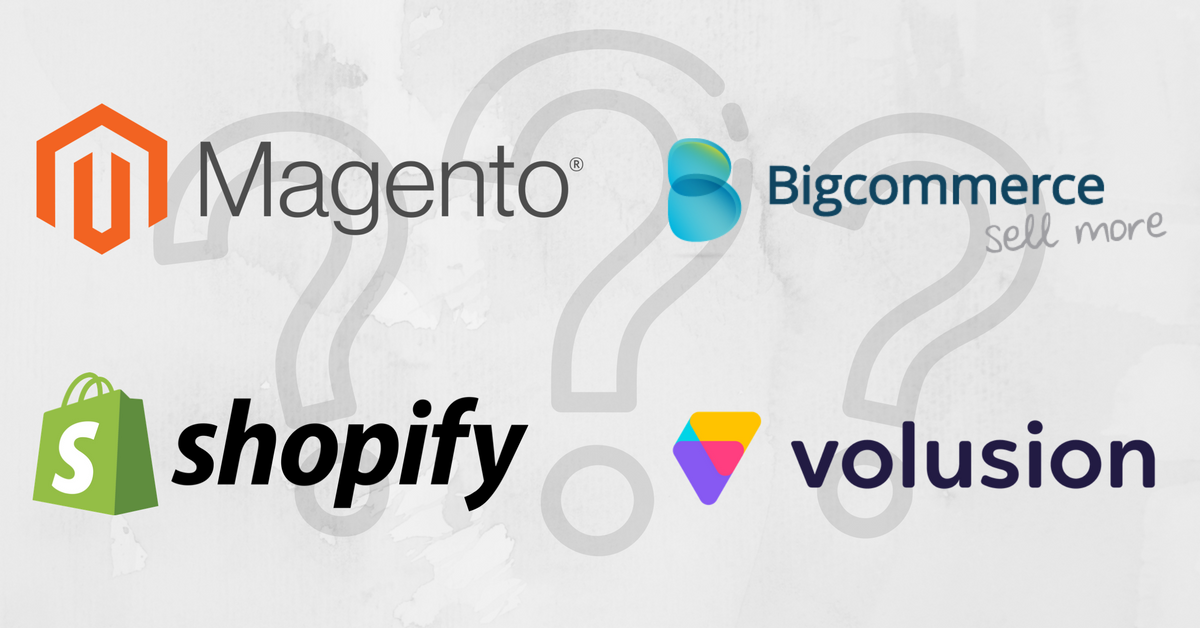Choosing the right ecommerce platform is an important, yet rather difficult task for new business owners, and one of the biggest questions you'll have is which platform to choose and why?
It's important to note that there's so many ecommerce platforms out there, but there's no 'one size fits all' solution. Each platform has its own sets of strengths and weaknesses.
First of all, why do so many website developers and other experts stress the importance of 'the right ecommerce platform'?
The right platform for your business can save a lot of time in the future. Rather than building on a simple drag-and-drop to find that it's rather incapable and doesn't tick all boxes, then needing to waste time and money on building a new platform – it's so much easier choosing it right the first time around.
So how do you choose the right platform? Here are a few of the factors you should be considering:
1. What's your business?
Are you selling physical goods or digital services? This will factor into what types of extensions and plug ins you'll need to manage the types of products and services that you sell.
2. What things do you need in your website to make it easier to run your business?
Leading on from the previous point, if your business requires specialised extensions tohandle inventory, shipping, and payment – you may favour platforms such as Magento over other simple drag and drops.
3. How easy will it be to manage without a web team by your side?
Content Management Systems such as Wordpress, Shopify and WIX differ in terms of how easily you can modify your product offerings and web content. In comparison, if your website is built on Joomla, it might take a bit more getting used to.
4. How often does this platform update, and how often will you need a web team to help you update?
While there are a lot of benefits with platforms that constantly update their offerings to fix issues and to give you even more flexibility – it can also be quite annoying if extensions or certain parts of your website become outdated because of these updates. When this happens and your extensions can no longer run properly – will you have a developer that can help you fix these issues, or find good alternatives?
Those are only a few of the factors you will need to consider when looking for the right ecommerce platform. As always, budgets and plans will always factor into whether this is the right platform for you.
What platforms are out there?
Magento
This is a common favourite amongst developers. Magento is an open-source software that is super flexible, full-featured e-commerce software platform that works for just about any type of business. Given that it's extremely flexible with a lot of extensions, it can be completed tailored to your needs. The Magento software can also sync with other data systems a well, letting you fully integrate it into your business and marketing operations. You can choose the popular Magento Community version or Magento Enterprise, which caters to larger online businesses.There are so many more platforms out there, but it would take us way too long to talk about the advantages and disadvantages of each one – so make sure to do your own research before buying in.
Shopify, BigCommerce & Volusion
We're grouping these few together, because they're very similar in the way that they allow you to create your own online store out of various customisable templates. They're a hugely popular option for business owners who wants to take a do-it-yourself approach. They all have their own pricing models, features, plugins and user interface – so it's best to compare to see which might best fit your business needs.
- Shopify: Focuses on design and user experience. If you have previously used Wordpress – you'll feel right at home with this platform. They provide a range of customisable templates that can be tailored to suit your needs. This platform comes with numerous tools that can help you manage your inventory, shipping and handling, payment and more.
- BigCommerce: Is a little more advanced, making it excellent for creating more tailored choices, but a little more cumbersome for tasks such as adding products. Their options for templates aren't as far and wide as Shopify – but if once you get your head around using this type of interface, it will make life a little easier when it comes to customising the smaller details of your online shop. Being more advanced, it also offers more extensions right out of the box – including addons such as basic email marketing tools.
- Volusion: gives you a lot more built-in functions. However, even as an older company – and possibly because they're an older company, they don't offer as much quality or quantity of professional, polished looking templates that exists with Shopify. It is worth noting that they don't charge transaction fees that are charged by Shopify.
Which one would we recommend?
As we mentioned before, there are so many platforms out there, and there are so many platforms that are out there for different needs. There's no one size fits all when it comes to choosing the right website platform. In terms of the ones that we listed, Magento is the one that is often recommended by developers. However, despite the customisability of the platform, it often requires technical professionals to manage and handle it. But if you have the resources for that – we'd go Magento all the way.



